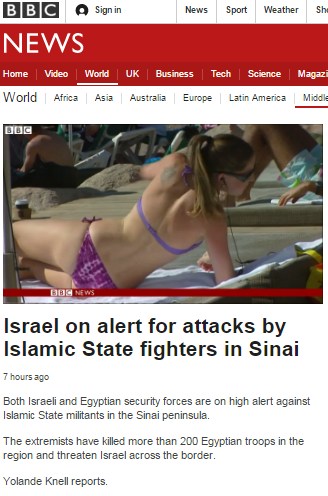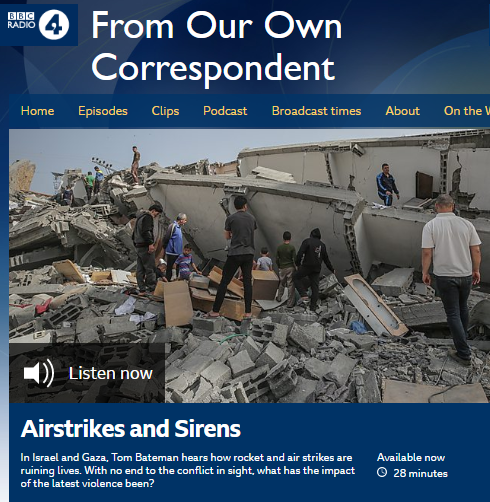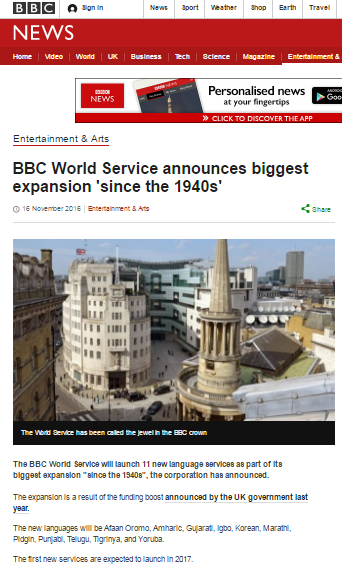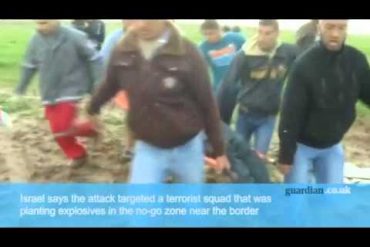We have often noted on these pages that the BBC’s coverage of Palestinian affairs is for the most part focused on subjects with some sort of connection to the Palestinian-Israeli conflict and that the corporation shows considerably less interest in reporting on internal Palestinian topics such as domestic politics, human rights or social issues. Even reports which ostensibly do deal with purely Palestinian stories are frequently used as a hook for political messaging.
Throughout the first quarter of 2015 twenty-nine reports relating to the Palestinian Authority, PA controlled areas and the Gaza Strip appeared on the BBC News website, along with an additional three previously discussed reports relating to specific incidents of terrorism perpetrated by Palestinian attackers.
Four of those reports related to the Palestinian Authority’s bid to join the ICC: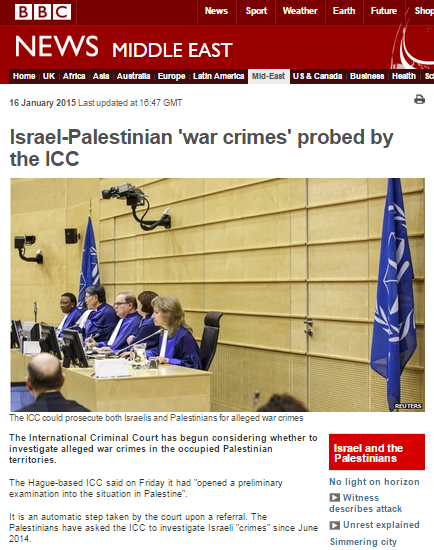
Palestinians sign up to join International Criminal Court (discussed here)
Palestinians submit ICC membership bid documents
Will ICC membership help or hinder the Palestinians’ cause? (originally published on January 14th – discussed here)
Israel-Palestinian ‘war crimes’ probed by the ICC (discussed here)
Three reports were about PA tax revenue transfers suspended – and later reinstated – by Israel:
Israel freezes Palestine tax funds over ICC bid
US opposes Israeli tax freeze on Palestinians
Israel to resume tax transfers to Palestinian Authority (discussed here)
One report related to the PLO’s recommendation to halt security cooperation with Israel:
PLO votes to end historic Israeli security agreement (discussed here)
One report concerned Palestinian views of the Israeli election:
Israel election: The view from Ramallah – Yolande Knell (discussed here)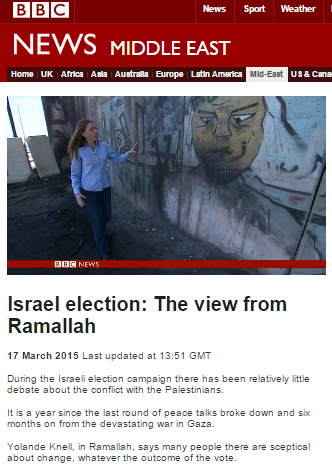
One report marked the ten-year anniversary of the death of Yasser Arafat:
Arafat’s widow on husband’s legacy (discussed here)
Two reports related to water issues connected to the city of Rawabi:
Rawabi: A new Palestinian city in the West Bank and The new Palestinian city that lacks only one thing – Lyse Doucet (discussed here)
Three reports concerned terrorism:
Palestinian jailed for murder of Israeli teenagers (discussed here)
The lost sons (discussed here)
Palestinian groups face $218m Israel attacks fine in US (discussed here)
Three reports related to damage to buildings in the Gaza Strip resulting from last summer’s conflict and the slow pace of reconstruction:
Gaza resident: ‘Everyone has forgotten us’ – Lyse Doucet (discussed here)
Caught in a wasteland: Gaza six months after the ceasefire – Lyse Doucet (discussed here)
Banksy artwork appears on the streets and walls of Gaza – Rushdi Abualouf (discussed here)
Two reports concerned Palestinian Islamic Jihad rearmament:
Palestinian Islamic Jihad have rearmed and replenished ranks and Inside Gaza’s tunnels, militants get ready for the next war – Quentin Sommerville (discussed here)
One article was about an Amnesty International report on the subject of Hamas war crimes:
Amnesty: Hamas rocket attacks amounted to war crimes
Examples of reports ostensibly covering Palestinian stories but used as a hook for political messaging include a feature by Yolande Knell on Christmas in Bethlehem, an article by Yolande Knell on Palestinian democracy, a sports article and a report about a protest in Ramallah.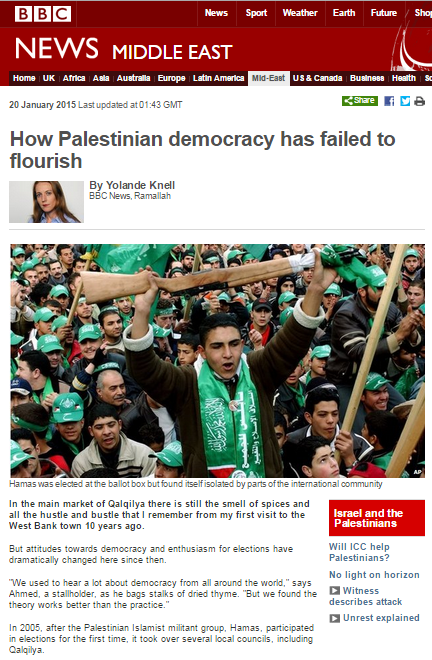
The town with three Christmas Days – Yolande Knell (discussed here)
How Palestinian democracy has failed to flourish – Yolande Knell (discussed here)
Palestine lose 4-0 to Japan in first Asian Cup match (discussed here)
Canada’s foreign minister egged in Ramallah by protesters and Palestinians throw eggs at Canada’s John Baird (discussed here)
Just three of the reports appearing on the BBC News website during the first quarter of 2015 can be said to give audiences some sort of glimpse into Palestinian social issues. In “Saving Gaza’s only grand piano” Tim Whewell briefly touches on the issue of attitudes towards music:
“but with […] a steady growth of conservatism in local society, such performances became a thing of the past. After the Islamist militant movement, Hamas, took over the Gaza Strip in 2007, live music events became even rarer.”
And:
“The music school has existed for seven years, discreetly hidden away inside the Gaza headquarters of the Palestinian Red Crescent. It operates only in the evenings but provides a rare space for music in a society where some reject it as haram – forbidden by God.”
The BBC Monitoring report titled “Palestinian paper apologises over ‘Muhammad cartoon'” includes a brief description of what it deems to be the prevalent social attitude on that topic and the Palestinian Authority’s reaction.
Whilst Rushdi Abualouf informs readers of his article titled “Can music help to de-stigmatise disability in Gaza?” that “despite the high prevalence of people with disabilities in the territory, disabled children are still shrouded in social stigma” he refrains from informing readers about the relevant topic of congenital disabilities – instead focusing their attentions on ‘the conflict’ as a cause of disability.
“The tiny territory has been blighted by successive conflicts between Palestinian militants and Israel, which have had serious physical and psychological impacts on the population.
It’s estimated that between 126,000 and 270,000 members of the population in Gaza are disabled, according to a 2012 report by the Palestinian Central Bureau of Statistics, and the 50-day conflict last summer has left many more with a long-term or permanent impairment.”
Palestinian paper apologises over ‘Muhammad cartoon’
Can music help to de-stigmatise disability in Gaza? – Rushdi Abualouf
Saving Gaza’s only grand piano – Tim Whewell
However, visitors to the BBC News website during the first quarter of 2015 learned nothing substantial about the ongoing animosity between ‘unity government’ partners Hamas and Fatah which continues to deter international donors from contributing to reconstruction in the Gaza Strip. They were also not informed of the resignation of the unity government’s deputy prime minister or of allegations of human rights abuses by Hamas and a PA crackdown on social media users and journalists. The topic of Hamas’ rearming and reorganization was only briefly mentioned in a couple of BBC reports with no serious attempt made to explore that obviously important issue. And of course the topic of the long overdue elections for both the Palestinian legislative body and president remain a no-go area for BBC journalists – along with subjects such as women’s rights, gay rights and the rights of religious minorities.
As the BBC’s World Editor acknowledged last year, the fact that it has permanent offices in Gaza, Ramallah and Jerusalem – as well as an entire Arabic-speaking division – means that the BBC is better placed than most if not all Western media organisations to provide its audiences with quality in-depth journalism which goes beyond the usual flat-pack reports on the subject of ‘the conflict’. So whilst there is already a way, what appears to be lacking is a will – and the question the corporation’s funding public must be asking is why.

